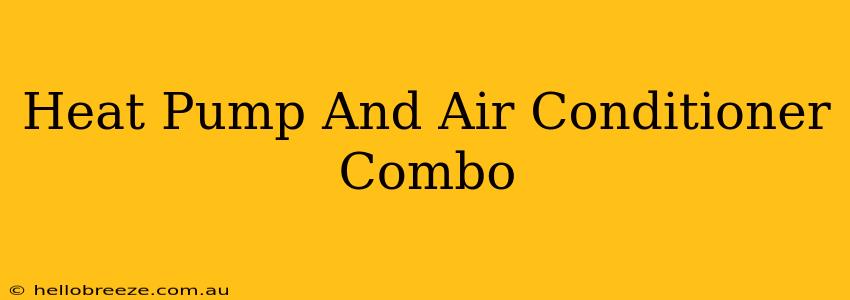Are you tired of juggling separate heating and cooling systems? A heat pump and air conditioner combo might be the perfect solution for your home comfort needs. This innovative system offers energy efficiency, cost savings, and year-round climate control – all in one package. Let's dive into the details to see if this is the right choice for you.
What is a Heat Pump and Air Conditioner Combo?
A heat pump and air conditioner combo system isn't two separate units, but rather a single system that leverages the power of a heat pump for both heating and cooling. Unlike traditional furnaces, heat pumps don't burn fuel to generate heat. Instead, they extract heat from the outside air (even in cold temperatures) and transfer it indoors, warming your home. In the summer, the process reverses, removing heat from your home and releasing it outside.
This integrated approach simplifies your HVAC setup, reducing the need for separate components and potentially lowering installation and maintenance costs.
Key Advantages of a Heat Pump/AC Combo:
- Energy Efficiency: Heat pumps are significantly more energy-efficient than traditional electric furnaces, often boasting a higher Seasonal Energy Efficiency Ratio (SEER) and Heating Seasonal Performance Factor (HSPF). This translates into lower energy bills and a smaller carbon footprint.
- Cost Savings: The long-term energy savings associated with higher efficiency can lead to substantial cost savings over the lifespan of the system.
- Simplified System: One unit handles both heating and cooling, reducing complexity and potential points of failure compared to two separate systems.
- Year-Round Comfort: Enjoy consistent comfort throughout the year without the need to switch between separate heating and cooling systems.
- Compact Design: Often, the combined unit has a smaller footprint than a separate furnace and air conditioner, saving valuable space.
Potential Drawbacks:
- Cold Climate Performance: While heat pump technology has advanced significantly, their efficiency can decrease in extremely cold climates. Supplemental heating may be necessary in very low temperatures.
- Higher Initial Cost: The initial purchase price of a heat pump/AC combo might be higher than separate systems, though this is often offset by long-term savings.
- Professional Installation Required: Proper installation is crucial for optimal performance. Always choose a qualified HVAC technician for installation and maintenance.
Heat Pump vs. Traditional HVAC Systems: A Comparison
| Feature | Heat Pump/AC Combo | Traditional Furnace & AC |
|---|---|---|
| Heating Method | Heat extraction from outside air | Fuel combustion (gas, oil) or electric resistance |
| Cooling Method | Refrigerant cycle | Refrigerant cycle |
| Efficiency | Generally higher | Generally lower |
| Cost | Higher initial cost, lower long-term cost | Lower initial cost, higher long-term cost |
| Complexity | Simpler system | More complex system |
| Environmental Impact | Lower carbon footprint | Higher carbon footprint (for fossil fuel options) |
Choosing the Right System for Your Home
The decision of whether a heat pump and air conditioner combo is right for you depends on several factors:
- Climate: Consider the coldest temperatures you experience in your area. In extremely cold climates, supplemental heating might be necessary.
- Home Size: The size of your home will determine the capacity of the system you need.
- Budget: Factor in both the initial investment and potential long-term savings.
- Energy Efficiency Goals: If reducing your environmental impact and energy bills is a priority, a heat pump/AC combo is a strong contender.
Consult with an HVAC professional to assess your specific needs and determine the best heating and cooling solution for your home. They can help you choose the right size and type of system to ensure optimal comfort and efficiency. Don't hesitate to ask questions and compare quotes from multiple contractors. Investing in a quality system and professional installation will pay off in the long run with improved comfort and energy savings.

